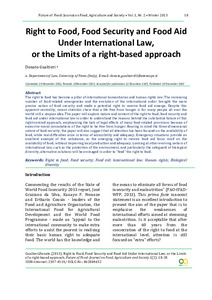Datum
2013-12-20Autor
Gualtieri, DonatoSchlagwort
630 Landwirtschaft, VeterinärmedizinMetadata
Zur Langanzeige
Aufsatz

Right to Food, Food Security and Food Aid Under International Law, or the Limits of a right-based approach
Zusammenfassung
The right to food has become a pillar of international humanitarian and human rights law. The increasing number of food-related emergencies and the evolution of the international order brought the more precise notion of food security and made a potential right to receive food aid emerge. Despite this apparent centrality, recent statistics show that a life free from hunger is for many people all over the world still a utopian idea. The paper will explore nature and content of the right to food, food security and food aid under international law in order to understand the reasons behind the substantial failure of this right-centred approach, emphasising the lack of legal effects of many food-related provisions because of excessive moral connotations of the right to be free from hunger. Bearing in mind the three-dimensional nature of food security, the paper will also suggest that all attention has been focused on the availability of food, while real difficulties arise in terms of accessibility and adequacy. Emergency situations provide an excellent example of this unbalance, as the emerging right to receive food aid focus itself on the availability of food, without improving local production and adequacy. Looking at other evolving sectors of international law, such as the protection of the environment, and particularly the safeguard of biological diversity, alternative solutions will be envisaged in order to “feed” the right to food.
Zitierform
In: Future of Food: Journal on Food, Agriculture and Society. Witzenhausen : University of Kassel, Department of Organic Food Quality and Food Culture. - Vol. 1, No. 2 (2013), S. 18-28Zitieren
@article{urn:nbn:de:hebis:34-2014021145056,
author={Gualtieri, Donato},
title={Right to Food, Food Security and Food Aid Under International Law, or the Limits of a right-based approach},
year={2013}
}
0500 Oax 0501 Text $btxt$2rdacontent 0502 Computermedien $bc$2rdacarrier 1100 2013$n2013 1500 1/eng 2050 ##0##urn:nbn:de:hebis:34-2014021145056 3000 Gualtieri, Donato 4000 Right to Food, Food Security and Food Aid Under International Law, or the Limits of a right-based approach / Gualtieri, Donato 4030 4060 Online-Ressource 4085 ##0##=u http://nbn-resolving.de/urn:nbn:de:hebis:34-2014021145056=x R 4204 \$dAufsatz 4170 7136 ##0##urn:nbn:de:hebis:34-2014021145056
<resource xsi:schemaLocation="http://datacite.org/schema/kernel-2.2 http://schema.datacite.org/meta/kernel-2.2/metadata.xsd"> 2014-02-11T11:58:25Z 2014-02-11T11:58:25Z 2013-12-20 2197-411X urn:nbn:de:hebis:34-2014021145056 http://hdl.handle.net/123456789/2014021145056 eng Department of Organic Food Quality and Food Culture at the University of Kassel, Germany and Federation of German Scientists (VDW) Urheberrechtlich geschützt https://rightsstatements.org/page/InC/1.0/ Right to food Food security Food aid International law Human rights Biological diversity 630 Right to Food, Food Security and Food Aid Under International Law, or the Limits of a right-based approach Aufsatz The right to food has become a pillar of international humanitarian and human rights law. The increasing number of food-related emergencies and the evolution of the international order brought the more precise notion of food security and made a potential right to receive food aid emerge. Despite this apparent centrality, recent statistics show that a life free from hunger is for many people all over the world still a utopian idea. The paper will explore nature and content of the right to food, food security and food aid under international law in order to understand the reasons behind the substantial failure of this right-centred approach, emphasising the lack of legal effects of many food-related provisions because of excessive moral connotations of the right to be free from hunger. Bearing in mind the three-dimensional nature of food security, the paper will also suggest that all attention has been focused on the availability of food, while real difficulties arise in terms of accessibility and adequacy. Emergency situations provide an excellent example of this unbalance, as the emerging right to receive food aid focus itself on the availability of food, without improving local production and adequacy. Looking at other evolving sectors of international law, such as the protection of the environment, and particularly the safeguard of biological diversity, alternative solutions will be envisaged in order to “feed” the right to food. open access In: Future of Food: Journal on Food, Agriculture and Society. Witzenhausen : University of Kassel, Department of Organic Food Quality and Food Culture. - Vol. 1, No. 2 (2013), S. 18-28 Gualtieri, Donato </resource>
Die folgenden Lizenzbestimmungen sind mit dieser Ressource verbunden:
Urheberrechtlich geschützt

